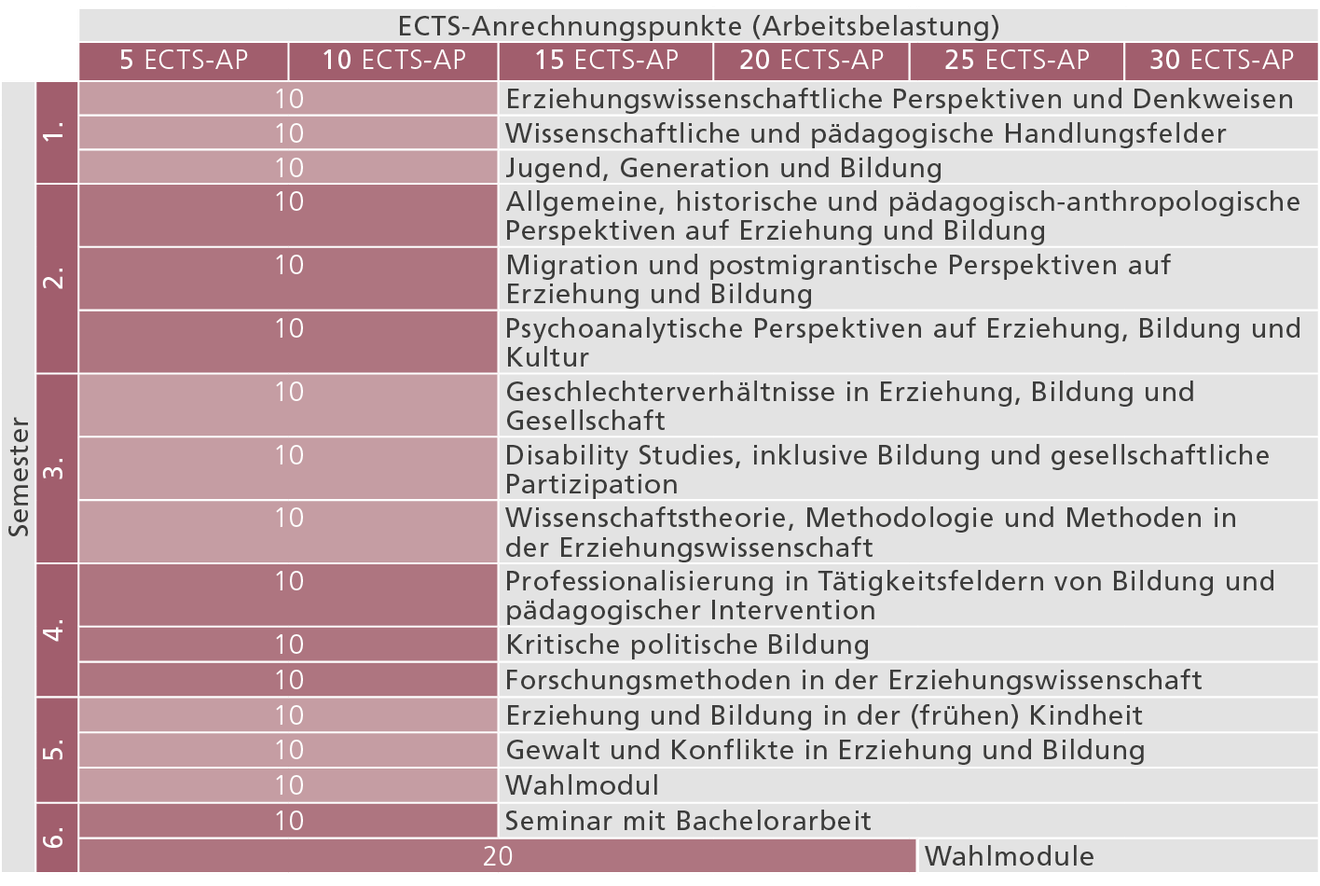Bachelorstudium Erziehungswissenschaft
Curriculum (2023W)
Bachelor of Arts (BA)
Dauer / ECTS-AP
6 Semester / 180 ECTS-AP
Studienart
Vollzeit
Sprache
Deutsch
Voraussetzung
Matura/Äquivalentes Zeugnis und Sprachnachweis
Fakultät
Fakultät für Bildungswissenschaften
Niveau der Qualifikation
Bachelor (1. Studienzyklus)
ISCED-11: Stufe 6, EQR/NQR: Stufe 6
ISCED-F
0111 Erziehungswissenschaft
Studienkennzahl
UC 033 645
Das Curriculum ist die Grundlage eines Studiums und vermittelt einen detaillierten Überblick zum Aufbau, zum Inhalt, zur Prüfungsordnung und zum Qualifikationsprofil.
Mittels Curriculum können mehrere wichtige Fragen bereits vor Studienbeginn geklärt werden: welche Zulassungsvoraussetzungen gelten für das Bachelorstudium Erziehungswissenschaft, wie lange dauert das Studium, welche Module müssen absolviert werden etc.
Für das Bachelorstudium Erziehungswissenschaft gilt aktuell das Curriculum 2023W.
Informationen zum Curriculum (2023W)
Die Gesamtfassung des Curriculums spiegelt das aktuell gültige Curriculum wider, ist rechtlich unverbindlich und dient lediglich der Information. Die rechtlich verbindliche Form des Curriculums inkl. etwaiger Änderungen finden Sie in den entsprechenden Mitteilungsblättern.
Die Information, welche Curriculumsversion für Sie gilt, entnehmen Sie bitte Ihrem Studienblatt
abrufbar unter: https://lfuonline.uibk.ac.at/public/lfuonline_meinestudien.studienblatt
Spalte: Curriculum in der geltenden Fassung
- Mitteilungsblatt vom 05.07.2023, 56. Stück, Nr. 630 (Äquivalenzliste)
- Mitteilungsblatt vom 07.06.2023, 48. Stück, Nr. 542 (Berichtigung des Curriculums)
- Mitteilungsblatt vom 11.05.2023, 36. Stück, Nr. 487
Studieneingangs- und Orientierungsphase
(1) Im Rahmen der Studieneingangs- und Orientierungsphase, die im ersten Semester stattfindet, sind folgende Lehrveranstaltungsprüfungen abzulegen:
- VO Einführung in die Erziehungswissenschaft (PM 1 lit. a, 2 SSt/5 ECTS-AP),
- VO Gesellschaftliche, institutionelle und individuelle Bedingungen von Erziehung und Bildung (PM 1 lit. b, 2 SSt/5 ECTS-AP),
(2) Der positive Erfolg bei allen Prüfungen der Studieneingangs- und Orientierungsphase berechtigt zur Absolvierung der weiteren Lehrveranstaltungen und Prüfungen sowie zum Verfassen der Bachelorarbeit.
(3) Vor der vollständigen Absolvierung der Studieneingangs- und Orientierungsphase können Lehrveranstaltungen im Ausmaß von 20 ECTS-AP absolviert werden. Im Curriculum festgelegte Anmeldungsvoraussetzungen sind einzuhalten.
Empfohlener Studienverlauf
Der unten angeführte, exemplarische Studienverlauf gilt als Empfehlung für Vollzeitstudierende, die das Studium im Wintersemester beginnen. Die Aufstellung dient der Darstellung eines möglichen Studienablaufs und ist nicht verpflichtend. Etwaige Prüfungswiederholungen bzw. deren studienzeitverzögernde Wirkung sind nicht berücksichtigt.
Die Regelstudienzeit beträgt 6 Semester bzw. 180 ECTS-AP, wobei gemäß Universitätsgesetz die Arbeitsbelastung eines Studienjahres 1.500 (Echt-)Stunden zu betragen hat und dieser Arbeitsbelastung 60 Anrechnungspunkte zugeteilt werden (ein ECTS-Anrechnungspunkt entspricht einer Arbeitsbelastung der Studierenden von 25 Stunden).
10 ECTS-AP: Erziehungswissenschaftliche Perspektiven und Denkweisen
10 ECTS-AP: Wissenschaftliche und pädagogische Handlungsfelder
10 ECTS-AP: Jugend, Generation und Bildung
10 ECTS-AP: Allgemeine, historische und pädagogisch-anthropologische Perspektiven auf Erziehung und Bildung
10 ECTS-AP: Migration und postmigrantische Perspektiven auf Erziehung und Bildung
10 ECTS-AP: Psychoanalytische Perspektiven auf Erziehung, Bildung und Kultur
10 ECTS-AP: Geschlechterverhältnisse in Erziehung, Bildung und Gesellschaft
10 ECTS-AP: Disability Studies, inklusive Bildung und gesellschaftliche Partizipation
10 ECTS-AP: Wissenschaftstheorie, Methodologie und Methoden in der Erziehungswissenschaft
10 ECTS-AP: Professionalisierung in Tätigkeitsfeldern von Bildung und pädagogischer Intervention
10 ECTS-AP: Kritische politische Bildung
10 ECTS-AP: Forschungsmethoden in der Erziehungswissenschaft
10 ECTS-AP: Erziehung und Bildung in der (frühen) Kindheit
10 ECTS-AP: Gewalt und Konflikte in Erziehung und Bildung
10 ECTS-AP: Wahlmodul
10 ECTS-AP: Seminar mit Bachelorarbeit
20 ECTS-AP: Wahmodule

| Semester | ECTS-AP | Titel |
|---|---|---|
Wahlpaket
Im Rahmen des Bachelorstudiums kann ein Wahlpaket im Umfang von 30 ECTS-AP absolviert werden.
Weiterführende Informationen bzw. eine Liste möglicher Wahlpakete sind abrufbar unter:
https://www.uibk.ac.at/studium/angebot/wahlpakete/
Informationen zur Prüfungsordnung inkl. Bewertung und Benotung
Prüfungsordnung
Die Prüfungsordnung ist integraler Bestandteil des Curriculums, detaillierte Informationen finden Sie unter dem Paragrafen Prüfungsordnung.
Bei der Notenverteilungsskala handelt es sich um die statistische Darstellung der Verteilung aller positiv absolvierten Prüfungen, die innerhalb eines Studiums bzw. eines Studienfaches (unter Heranziehung aller gemeldeten Studierenden eines Studiums bzw. eines Studienfaches) erfasst wurden. Die Notenverteilungsskala wird in regelmäßigen Abständen aktualisiert.
| Österreichische Notenskala | Definition | %-Satz | ||
| 1 | SEHR GUT | 33,8 | = 100% | |
| 2 | GUT | 32,0 | ||
| 3 | BEFRIEDIGEND | 22,1 | ||
| 4 | GENÜGEND | 12,1 | ||
| 5 | NICHT GENÜGEND |
März 2025
Gesamtbeurteilung der Qualifikation
Nicht zutreffend
Erklärung: Eine Gesamtbeurteilung (mit Auszeichnung bestanden, bestanden, nicht bestanden) wird nur über eine studienabschließende Prüfung, die aus mehr als einem Fach besteht, vergeben (im Curriculum dieses Studiums ist diese nicht vorgesehen).
Formulare
- Anerkennung von formalen (Vor-)Leistungen (RPL-Projekt)
- Nachweis über die Bachelorarbeit gemäß Curriculum
- Prüfungsprotokoll
Hinweis: Nach positiver Absolvierung der letzten Prüfung des Bachelorstudiums sind das ausgefüllte "Prüfungsprotokoll" sowie der "Nachweis über die Bachelorarbeit gemäß Curriculum" im Prüfungsreferat einzureichen. - Ansuchen um Anerkennung von PrüfungenUNDBeiblatt
- Anerkennung von Prüfungen aus dem Diplomstudium Pädagogik gemäß Verordnung
- Einreichung der Bachelorarbeit
- Antrag um Zulassung zur dritten und vierten Wiederholung einer Lehrveranstaltungsprüfung
Kontakt und Information
Prüfungsreferat
Standort Innrain 52d
Studienbeauftragte
Dr. habil. Petra Reinhartz
(Anerkennungen für Studierende mit Anfangsbuchstaben des Nachnamens A - M)
Dr. Peter Münte
(Anerkennungen für Studierende mit Anfangsbuchstaben des Nachnamens N - Z)
Studiendekan
assoz.-Prof. MMag. Dr. Ulrich Leitner
